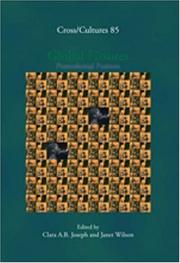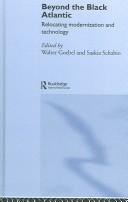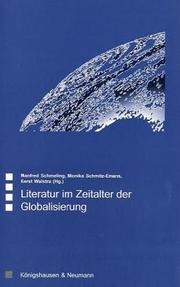| Listing 1 - 5 of 5 |
Sort by
|

ISBN: 9042020180 9401203091 1429456124 9781429456128 9789401203098 9789042020184 Year: 2006 Publisher: Amsterdam New York, NY Rodopi
Abstract | Keywords | Export | Availability | Bookmark
 Loading...
Loading...Choose an application
- Reference Manager
- EndNote
- RefWorks (Direct export to RefWorks)
The essays in this volume examine the tensions between two major political and intellectual structures: the global and the postcolonial, charting the ways in which such tensions are constitutive of changing power relations between the individual, the nation-state and global forces. Contributors ask how postcolonialism, with its emphasis on cultural difference and diversity, can respond to the new, neo-imperialist imperatives of globalization. Signalling the discursive grounds for debate is the fissures/fusions title, suggesting alternative categorizations of stereotypes like 'global homogenization' and 'postcolonial resistance'. Interwoven are considerations of the intellectual or writer's position today. Literary texts from a wide range of countries are analysed for their resistance to global hegemony and for representations of manipulative power structures, in order to highlight issues such as environmental loss, nationality, migrancy, and marginality. Specific topics covered include 'westernizing' the Indian academy, ecotourism and the new media of computer technology, the corporatization of creativity in 're-branding' New Zealand (including film), and the hybrid forms of Latin American photography. Writers discussed include Chinua Achebe, Samuel Beckett, Hafid Bouazza, Bei Dao, Mahmoud Darwish, Witi Ihimaera, James Joyce, Yann Martel, Rohinton Mistry, Ellen Ombre, Michael Ondaatje, George Orwell, Arundhati Roy, Salman Rushdie, and Edward Said. Different essays stress the hegemony of global networks; the technological revolution's revitalizing of niche marketing while marginalizing postcolonial resistance; the implications of the internationalization of culture for the indigene; and the potential of cultural hybridity to collapse cultural hierarchies.
Globalization in literature. --- Globalization --- Globalization. --- Postcolonialism in literature. --- Postcolonialism. --- Post-colonialism --- Postcolonial theory --- Political science --- Decolonization --- Global cities --- Globalisation --- Internationalization --- International relations --- Anti-globalization movement --- Philosophy. --- Political aspects. --- Postcolonialisme --- GLOBALISATION DANS LA LITTERATURE --- GLOBALISATION --- Dans la littérature --- PHILOSOPHIE

ISBN: 9780415397971 9780415397988 0203969723 9780203969724 0415397987 0415397979 9781134151547 9781134151585 9781134151592 Year: 2006 Publisher: London New York : Routledge,
Abstract | Keywords | Export | Availability | Bookmark
 Loading...
Loading...Choose an application
- Reference Manager
- EndNote
- RefWorks (Direct export to RefWorks)
Debates about the 'Black Atlantic' have alerted us to an experience of modernization that diverges from the dominant Western narratives of globalization and technological progress. This outstanding volume expands the concept of the Black Atlantic by reaching beyond the usual African-American focus of the field, presenting fresh perspectives on postcolonial experiences of technology and modernization. A team of renowned contributors come together in this volume in order to: * redefine and expand ideas of Black Atlantic * challenge unified concepts of modernization from a postcolonial perspective * question fashionable concepts of the transnational by returning to the local and the national * offer new approaches to cross-cultural mechanisms of exchange * explore utopian uses of technology in the postcolonial sphere. Exploring a variety of national, diasporan and transnational counternarratives to Western modernization, Beyond the Black Atlantic makes a valuable contribution to the fields of postcolonial, literary and cultural studies.
Comparative literature --- Thematology --- anno 1900-1999 --- Globalization in literature. --- Literature, Modern --- Postcolonialism in literature. --- Technology and civilization. --- Technology in literature. --- Black authors --- History and criticism. --- Minority authors --- TECHNOLOGIE DANS LA LITTERATURE --- GLOBALISATION DANS LA LITTERATURE --- Postcolonialisme --- LITTERATURE MODERNE --- Dans la littérature --- AUTEURS NOIRS --- HISTOIRE ET CRITIQUE
Book
ISBN: 9780231164412 9780231164405 0231164408 0231164416 Year: 2014 Volume: *1 Publisher: New York Columbia university press
Abstract | Keywords | Export | Availability | Bookmark
 Loading...
Loading...Choose an application
- Reference Manager
- EndNote
- RefWorks (Direct export to RefWorks)
Globalisation dans la littérature --- Globalisering in de literatuur --- Globalization in literature --- Political fiction, American --- American fiction --- Politics and literature --- Globalization in literature. --- American fiction. --- Globalization. --- Literature. --- Political fiction, American. --- Politics and literature. --- Englisch. --- Globalisierung. --- Literatur. --- Politik. --- Roman. --- History and criticism. --- 2000-2099. --- United States. --- USA. --- Literature --- Literature and politics --- American literature --- History and criticism --- Political aspects --- Political fiction [American ] --- 21st century --- United States

ISBN: 3826017935 9783826017933 Year: 2000 Volume: 13 Publisher: Würzburg : Königshausen und Neumann,
Abstract | Keywords | Export | Availability | Bookmark
 Loading...
Loading...Choose an application
- Reference Manager
- EndNote
- RefWorks (Direct export to RefWorks)
Comparative literature --- Thematology --- anno 2000-2099 --- Globalisation dans la littérature --- Globalisering --- Globalisering in de literatuur --- Globalization --- Globalization in literature --- Internationalisatie --- Internationalisation --- Internationalisering --- Internationalization --- Mondialisation --- Mundialisering --- Literature, Modern --- Multiculturalism in literature --- Internationalism in literature --- History and criticism --- 82.015.9 --- 82.091 --- 82:3 --- -Multiculturalism in literature --- Modern literature --- Arts, Modern --- Literaire stromingen: postmodernisme --- Vergelijkende literatuurstudie --- Literatuur en maatschappijwetenschappen --- 82:3 Literatuur en maatschappijwetenschappen --- 82.091 Vergelijkende literatuurstudie --- 82.015.9 Literaire stromingen: postmodernisme --- Literature, Modern - 20th century - History and criticism - Congresses --- Multiculturalism in literature - Congresses --- Internationalism in literature - Congresses
Book
ISBN: 9780199278497 Year: 2009 Publisher: Oxford : Oxford University Press,
Abstract | Keywords | Export | Availability | Bookmark
 Loading...
Loading...Choose an application
- Reference Manager
- EndNote
- RefWorks (Direct export to RefWorks)
In our current world, questions of the transnational, location, land, and identity confront us with a particular insistence. The Grammar of Identity is a lively and wide-ranging study of twentieth-century fiction that examines how writers across nearly a hundred years have confronted these issues. Circumventing the divisions of conventional categories, the book examines writers from both the colonial and postcolonial, the modern and postmodern eras, putting together writers who might not normally inhabit the same critical space: Joseph Conrad, Caryl Phillips, Salman Rushdie, Charlotte Brontë, Jean Rhys, Anne Michaels, W. G. Sebald, Nadine Gordimer, and J. M. Coetzee. In this guise, the book itself becomes a journey of discovery, exploring the transnational not so much as a literal crossing of boundaries but as a way of being and seeing. In fictional terms this also means that it concerns a set of related forms: ways of approaching time and space; constructions of the self by way of combination and constellation; versions of navigation that at once have to do with the foundations of language as well as our pathways through the world. From Conrad's waterways of the earth, to Sebald's endless horizons of connection and accountability, to Gordimer's and Coetzee's meditations on the key sites of village, Empire, and desert, the book recovers the centrality of fiction to our understanding of the world. At the heart of it all is the grammar of identity, how we assemble and undertake our versions of self at the core of our forms of being and seeing.
82.04 --- 820-3 "19" --- Literaire thema's --- Engelse literatuur: proza--20e eeuw. Periode 1900-1999 --- English fiction --- Globalization in literature. --- Identity (Psychology) in literature. --- International relations in literature. --- Transnationalism in literature. --- Kolonialisme. --- Nationale identiteit. --- Postkolonialisme. --- Romans. --- History and criticism. --- 820-3 "19" Engelse literatuur: proza--20e eeuw. Periode 1900-1999 --- 82.04 Literaire thema's --- Transnationalisme --- LITTERATURE ANGLAISE --- GLOBALISATION DANS LA LITTERATURE --- RUSHDIE (SALMAN), 1947 --- -SEBALD (WINFRIEG GEORG), 1944-2001 --- COETZEE (JOHN MAXWELL), 1940 --- -GORDIMER (NADINE), 1923 --- -PHILLIPS (CARYL), 1958 --- -RHYS (JEAN), 1894-1979 --- Conrad, Joseph (1857-1924) --- Dans la littérature --- 20E SIECLE --- HISTOIRE ET CRITIQUE --- CRITIQUE ET INTERPRETATION --- Critique et interprétation
| Listing 1 - 5 of 5 |
Sort by
|

 Search
Search Feedback
Feedback About UniCat
About UniCat  Help
Help News
News